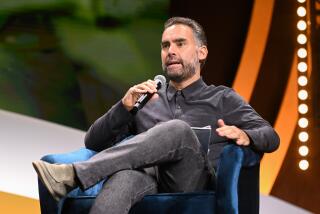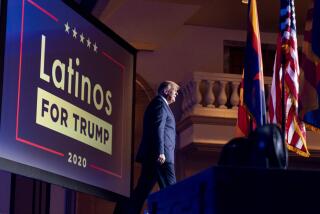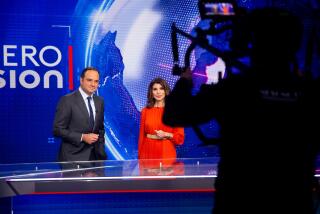No holds barred in Venezuela opposition channel’s criticism of Chavez
- Share via
Reporting from Caracas, Venezuela, and Bogota, — From the time it goes on the air until it signs off, Globovision lets Venezuelan President Hugo Chavez have it with both barrels.
The Caracas-based opposition news and opinion channel’s newsreaders and reporters — who make no pretense of impartiality and remain undeterred by harassment and threats of a takeover — regularly blast the president with obviously slanted coverage while giving opposition politicians free and usually unchallenged rein to vent.
“We think Hugo Chavez should be investigated for treason,” opposition leader Pablo Medina said calmly last week during a television interview as he discussed the president’s close ties to Cuba and his handling of a scandal involving imported food that rotted in scores of misplaced shipping containers.
Later that day, accusations of witchcraft came up in discussions of Chavez’s controversial decision to open the crypt of founding father Simon Bolivar, which psychologist Mercedes Pulido described as a “pornographic spectacle.” Globovision reporters called the scene ghoulish and sacrilegious.
In a discussion on the alleged presence in Venezuela of the Colombian rebel group the FARC, Chavez was accused of hosting terrorists. One person interviewed characterized the president as a coward, saying that in a war with Colombia, Chavez would be at the front with his troops, but only as they retreated “after the defeat.”
The station’s staff has blasted Chavez for his broadsides against the Roman Catholic Church in response to Cardinal Jorge Urosa’s accusation this month that Chavez is taking Venezuela down a “totalitarian” path toward “Marxist socialism.”
Also last week, after noting that it was Colombia’s independence day, newsreader Jesus Torrealba appeared to encourage viewers to rise up against the government: “Let’s hope the day comes when we struggle together against the bandits, kidnappers and guerrillas.”
On-air comments by viewers are invariably anti-government: tales of woe caused by rising crime, a sinking economy and Chavez’s alleged general mismanagement of the country.
The station says it is only upholding freedom of expression, which in Venezuela has come under fire as Chavez has forced other opposition news outlets, including TV channel RCTV and about 30 independent radio stations, off the air.
Some observers say Globovision is carrying on Venezuela’s rough-and-tumble partisan tradition.
“The media in the hands of the government is also aggressive, exclusive and considers the opposition its enemy and that it should be done away with,” said Marcelino Bisbal, professor of media studies at Andres Bello Catholic University in Caracas, the capital. “It’s a war over the political direction of the country.”
But Chavez, with some justification, says the station spreads calumny about him. He has filed numerous charges against its owners that include hoarding, defamation and tax evasion.
Globovision’s controlling stockholder, Guillermo Zuloaga, recently fled the country after the government issued an arrest warrant for him. He was detained briefly in March after verbally attacking Chavez at an international press convention in Aruba. On Tuesday, the government charged his attorney, Perla Jaimes, with obstruction of justice.
Meanwhile on Thursday, Jaimes said National Guard units had seized control of her client’s ranch, which she denounced as illegal.
On Wednesday, the country’s supreme court said it would open an investigation of whether Globovision “incited war” in a recent promotional campaign, and the leader of government-owned Mercal grocery chain led a protest outside the channel’s offices, telling reporters that it was trying to “destabilize” the nation.
Chavez is sending clear signals that he may take control of Globovision, asserting in a recent televised address that the government was entitled to a near-majority of stock in the channel’s holding company because of one major shareholder’s financial problems and the death of another, which Chavez contends should result in the stock reverting to the government.
“Add it up, compadre, we own 48.5%, so no one can say the government is expropriating the station,” Chavez said.
International press freedom and human rights groups, including Reporters Without Borders and the Inter American Press Assn., as well as the human rights arm of the Organization of American States, have defended Globovision.
But the tone of the station’s coverage of the nation’s leader and his reaction are clear indications of the severe political polarization of the country.
Mogollon, reporting from Kraul, reporting from are special correspondents.
More to Read
Sign up for Essential California
The most important California stories and recommendations in your inbox every morning.
You may occasionally receive promotional content from the Los Angeles Times.













